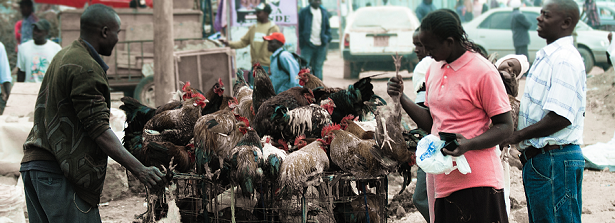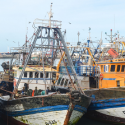Poultry development in Eastern Africa, a regional perspective

To harmonize the country-oriented Dutch development and economic diplomacy policies with increasing regional influences in poultry value chain developments, better insight is needed in the interdependency of the poultry sectors of different countries. Therefore, the Food & Business Knowledge Platform (F&BKP) has decided to support a study and learning project that will look into the various aspects of this interdependency in Eastern Africa (Kenya, Tanzania, Rwanda, Uganda).
The objective of the study and learning project is to gather relevant information on poultry developments in the Eastern African region with the aim of collecting and sharing this information with relevant stakeholders and advise the Netherlands Government on more regional-economic responsive policies for sector/value chain development.
Whilst the issues of interdependency can be recognized across the whole of Africa, the project will focus on Eastern Africa for practicability’s sake. The study will be conducted by an NABC representative resident in East Africa, and a Wageningen UR Livestock Research representative from the Netherlands.
The outcome of the study and learning project will be an analysis on how national poultry value chains are influenced by the dependency on inputs from and market outlets in other countries in the region and will serve as an input for rephrasing poultry value chain support strategies across Africa.
The study and sharing of the findings is a first step towards a larger project analysing aspects of regionalization in the development of poultry value chains, also in Southern Africa as well as in Western Africa. At the end of the larger study, a national meeting will be organized, discussing Dutch policies on support to sustainable poultry value chains in Africa, focusing on more effective integration of trade and aid in support of sustainable poultry development in Africa.
Brussels Briefing “Regional Trade in Africa: Drivers, Trends and Opportunities”
The issue of regional trade and interdependency is on the 2030 Agenda for Sustainable Development and hence receives increasing attention. On February 3, the 47th Brussels Development Briefing on the topic of “Regional Trade in Africa: Drivers, Trends and Opportunities” was held at the ACP Secretariat in Brussels for an audience of 200 people. The drivers, trends and opportunities discussed during this Briefing are valuable input for the project on poultry development in Eastern Africa.
One important obstacle for cross border trade discussed during the Briefing is the number of checkpoints per 100 km, delays per 100 km and also bribes. Regional trade agreements are key to strengthening intra African trade, through initiating studies into economically most viable locations for improving trade: various ports, border posts, etc. and through stimulating added value. For example, the quickest growth amongst western African countries has been in higher-value goods such as fish, animal products, vegetables and food oils. East Africa government agencies are strengthening customs in order to streamline procedures, and reduce costs and delays at borders.






